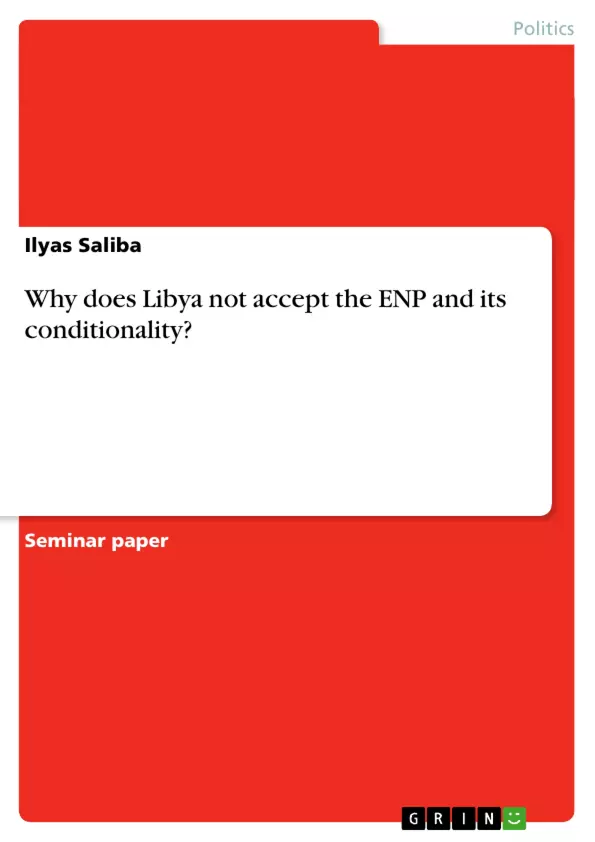The ENP includes all neighboring states of the European Union except the Russian Federation - No not all are included - there is one state that is neither a member of the ENP nor of any other formal or legal multilateral framework agreement with the EU - this is the Great Socialist People`s Libyan Arab Jamahiriya. Why is Libya the only neighbor state of the European Union that is not part of any legalized continuous process of interaction with the Union and what are the reasons? In order to find an answer to this question, in the following we will on the one hand draw the attention to the existing instruments for legal partnership agreements of the Unions external governance like the ENP or the Barcelona Process. Especially the policy instruments and the underlying theoretical assumptions of the ENP will be questioned in this part. On the other hand our emphasis will be to highlight the two-way interdependency between the EU and Libya as a reason for the non-participation of Libya in any of the existing institutionalized frameworks.
With the Puzzle described above as a starting point the argument, that the relation between the EU and Libya is different to that of the EU and any other of its neighboring states, will be enfolded. Thinking the Unions external governance as a „rationalist bargaining model“ (Schimmelfennig/ Sedelmeier 2004, p. 663) we will show that the bargaining position of Libya towards the EU is stronger than that of all ENP member states. The missing power-asymmetry between the Union and its neighbor in the case of Libya will then be pointed out as the main reason for the non- participation of Libya in the ENP or any other legal framework. This leads to the hypothesis, that Libya does not participate in any formal or legal foreign policy program by the EU, because the power relations in the bargaining process are not asymmetrical enough as to enable the Union to imposeinstruments of conditionality on Libya. Bound to the former is the argument, that the ENP as a foreign policy is insufficient to formalize the relations between the Union and Libya and therefore is even more insufficient as a stimulus for political reform.
Inhaltsverzeichnis (Table of Contents)
- Introduction
- Puzzle and Approach
- Hypothesis
- Main Part
- Theoretical background
- EU - Libya Relations
- Stakes and interests in the Policy Fields of Oil and Migration
- Formal Relations
- Outlook on future cooperation
- Conclusion
- The Dilemma of interdependence
- Critical perspective on the ENP
Zielsetzung und Themenschwerpunkte (Objectives and Key Themes)
This essay examines the reasons behind Libya's non-participation in the European Neighbourhood Policy (ENP) and its associated frameworks. It analyzes the ENP's theoretical foundations and its application to Libya's case, particularly focusing on the power dynamics and bargaining positions between the EU and Libya. The essay aims to understand why Libya, despite its re-emergence on the international stage and renewed relations with Europe, has chosen to remain outside any formalized agreements with the EU.
- The European Neighbourhood Policy (ENP) and its conditionality mechanisms
- Power dynamics and bargaining positions between the EU and Libya
- The role of strategic interests in oil and migration in shaping relations between the EU and Libya
- Libya's reluctance to engage in formalized agreements with the EU
- The potential for future cooperation between the EU and Libya
Zusammenfassung der Kapitel (Chapter Summaries)
The introduction introduces the puzzle of Libya's non-participation in the ENP and outlines the essay's approach and hypothesis. It argues that Libya's strong bargaining position, stemming from its strategic importance in oil and migration, prevents the EU from imposing conditionality on the country.
The main part delves into the theoretical background of the ENP, focusing on its "rationalist bargaining model" and its application to Libya. It then examines the economic and political interests of the EU and Libya in the oil and migration sectors, followed by a brief overview of formal relations between the two parties.
Schlüsselwörter (Keywords)
The key terms and concepts explored in this essay include the European Neighbourhood Policy (ENP), conditionality, power dynamics, bargaining positions, oil and migration, strategic interests, EU-Libya relations, and international relations.
Frequently Asked Questions
Why is Libya not part of the European Neighbourhood Policy (ENP)?
Libya has a strong bargaining position due to its strategic importance in oil and migration, leading to a lack of power asymmetry that prevents the EU from imposing formal conditions.
What is "conditionality" in EU foreign policy?
Conditionality refers to the EU's strategy of offering rewards (like trade benefits or aid) only if the neighboring country meets specific political and economic reform criteria.
How does oil influence EU-Libya relations?
As a major oil producer, Libya is a vital energy partner for the EU. This economic interdependency gives Libya leverage in negotiations, making it less susceptible to EU political pressure.
What role does migration play in this partnership?
Libya is a key transit country for migration to Europe. Cooperation in this field is essential for the EU, which further strengthens Libya's position in the "rationalist bargaining model."
Is the ENP an effective tool for reform in Libya?
The essay argues that the ENP is insufficient for Libya because the power relations are not asymmetrical enough to force political reforms through conditionality.
- Quote paper
- Ilyas Saliba (Author), 2009, Why does Libya not accept the ENP and its conditionality? , Munich, GRIN Verlag, https://www.grin.com/document/139220



